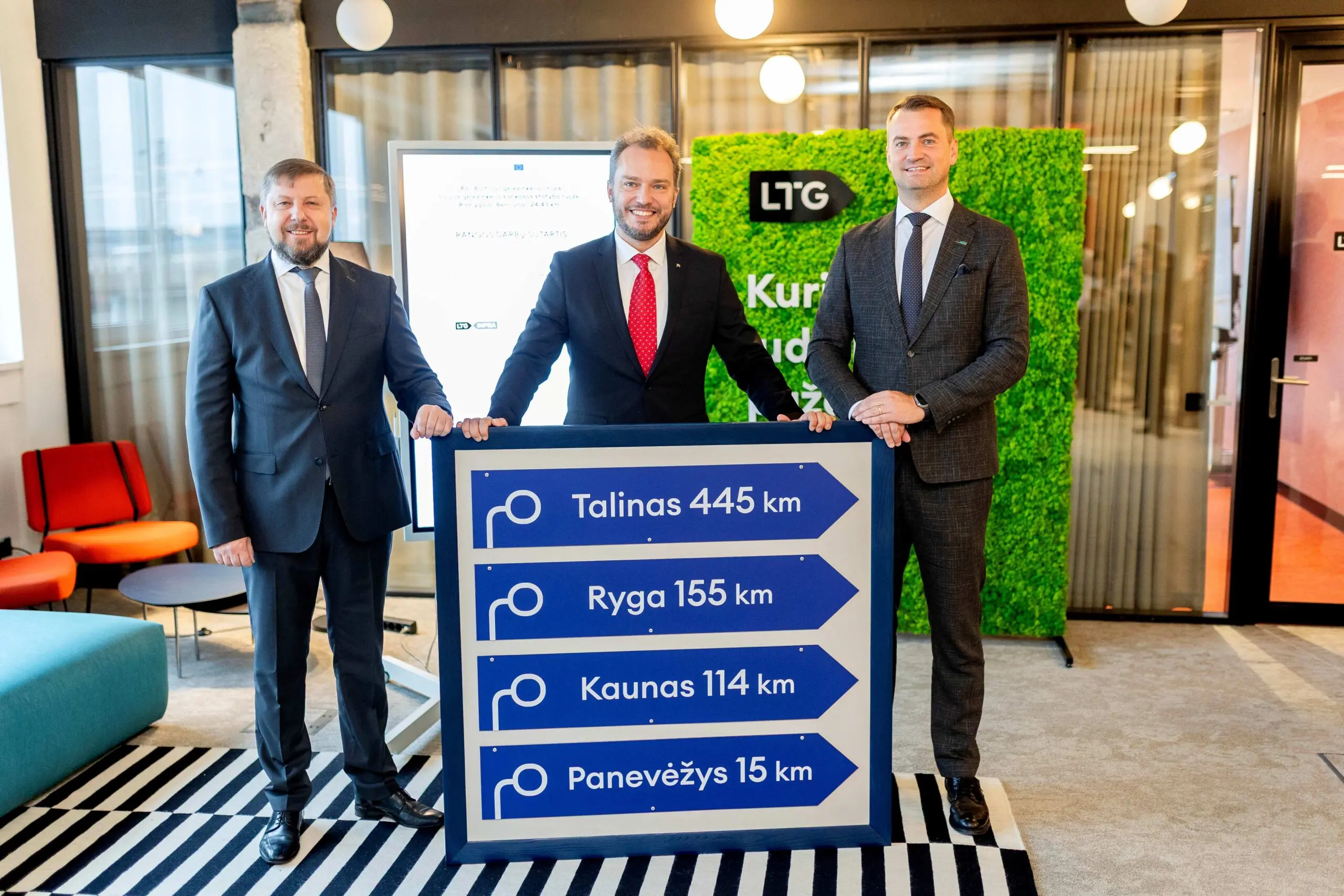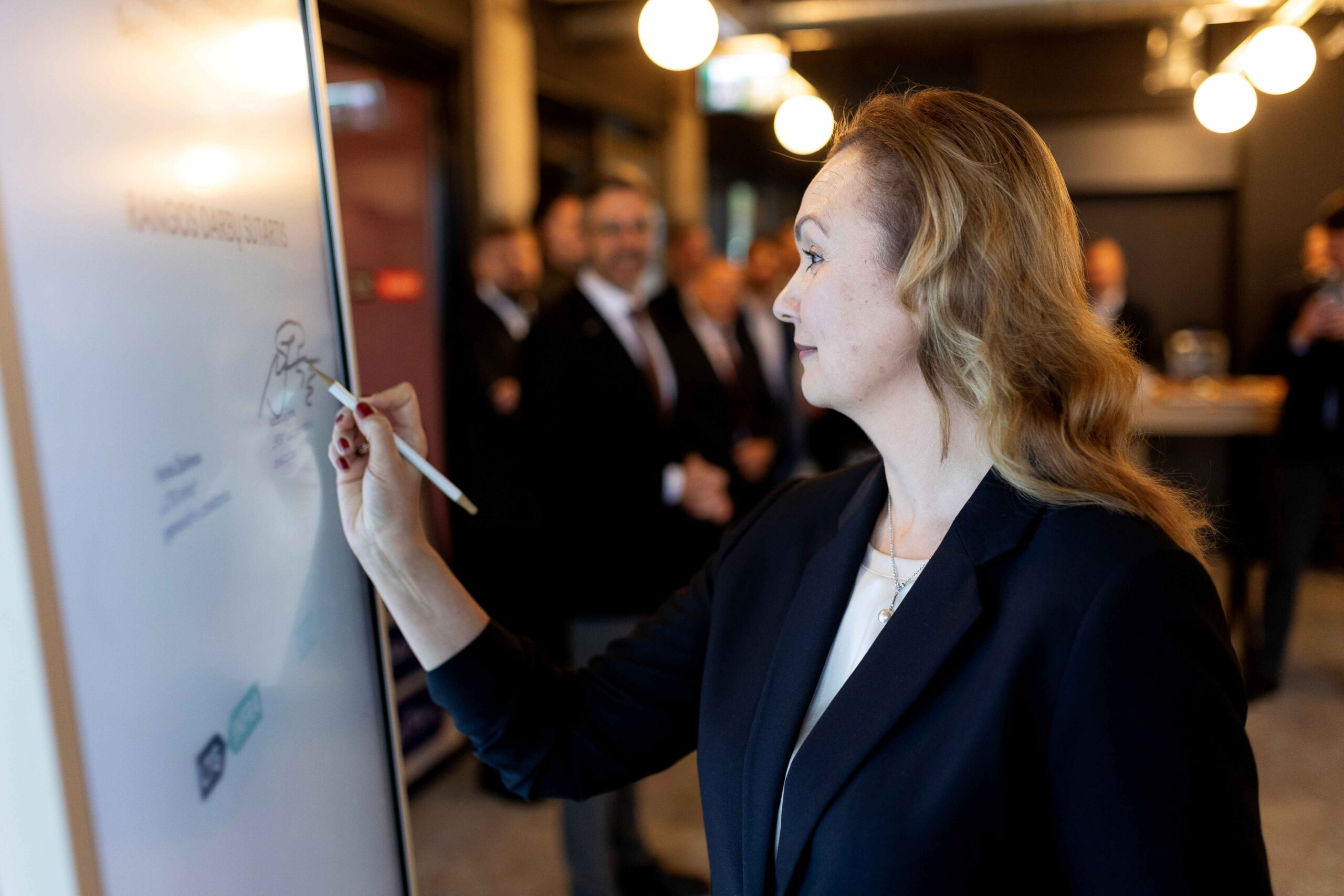LTG Infra, the infrastructure company of the LTG Group responsible for implementing the international Rail Baltica project in Lithuania, has signed two new construction contracts, successfully achieving its goal of extending the active construction section in Lithuania to 114 km by the end of the year.
Kauno Tiltai AB will construct 24.4 km of railway embankment and associated engineering structures on the Ramygala–Berčiūnai section. HISK AB will build an additional 12.3 km of railway embankment and engineering structures on the Berčiūnai–Joniškėlis section. The total value of these contracts is €375.8 million (including VAT).
To mark the increase in construction progress, the Ministry of Transport and Communications, together with the LTG Group, has decided to install a symbolic signpost near Panevėžys, commemorating this milestone.
“This signpost is a reminder that the work must continue – Rail Baltica is more than steel, it is a path towards more convenient and faster connections with our neighbours. It is also a strategic link that bolsters our security and resilience along Europe’s eastern flank. With this year’s goals accomplished, let us sustain the momentum – may construction soon reach this signpost,” said Juras Taminskas, Minister of Transport and Communications of Lithuania.
According to LTG Group CEO Egidijus Lazauskas, Rail Baltica contracts worth more than €800 million (including VAT) have been signed this year. These investments will be directed toward the development of the Rail Baltica project and will contribute significantly to the national economy.
“LTG Infra has successfully achieved its annual objective of expanding construction activities. This means that, compared to last year, we will invest twice as much in European funds, and we anticipate continued growth in the coming years, as construction between Kaunas and Panevėžys intensifies,” says Egidijus Lazauskas.
New contractor
The institutions implementing the Rail Baltica project, together with the joint Baltic company RB Rail AS, have signed more than 200 contracts with partners from over 20 countries worldwide.
“As construction progresses, new contractors continue to join the project. We are working closely with these companies to ensure steady progress and timely completion of contracts,” said Vytis Žalimas, CEO of LTG Infra.
According to Aldas Rusevičius, CEO of Kauno Tiltai, the company’s extensive experience will enable it to carry out the work efficiently.
“The scale of the project demands ambitious solutions and a rapid construction pace. As part of the Polish State Railways group, we are well-prepared for this new challenge. Our technical expertise and international experience bring added value in ensuring high-quality project delivery and effective management,” said A. Rusevičius.
In addition to the high-speed railway embankment, Kauno Tiltai will construct eight railway bridges, three railway viaducts, two animal crossings, and a green bridge, as well as reconstruct four sections of public roads. This is the largest embankment construction contract to date, valued at €248.9 million (including VAT).
Won three tenders
This year, HISK won three public procurement tenders for construction works under the Rail Baltica project. The contractor signed contracts for a 12.1 km section between Šėta and Ramygala, an 8.5 km section between Kaunas (Palemonas) and Šveicarija, and most recently, a contract for an additional 12.3 km section.
“Being entrusted with the implementation of three Rail Baltica sections reflects our team’s commitment and professionalism in delivering this strategic project for Lithuania. We continue to prepare intensively and are committed to ensuring smooth project execution while creating long-term value for Lithuania and the entire Baltic region,” says Robertas Ziminskis, CEO of HISK AB.
On the newest section, HISK will construct three railway viaducts, one bridge, 19 culverts and animal crossings, over 1 km of noise barriers, and will carry out major repairs on two nationally significant roads.
In addition, design work is underway for the section between the Lithuanian–Polish border and Kaunas (Jiesia). The work is jointly financed by the European Union and the Lithuanian state budget.

